I've Been Everywhere, Man.
Speaking of sad, 😔, read this article on Afghanistan. The rural parts. Definitely a different story and one you didn't hear much about during the "let's blame Biden for everything." Again, you can see why the entire edifice collapsed just like that.
In this way, Shakira’s tragedies mounted. There was Muhammad, a fifteen-year-old cousin: he was killed by a buzzbuzzak, a drone, while riding his motorcycle through the village with a friend. “That sound was everywhere,” Shakira recalled. “When we heard it, the children would start to cry, and I could not console them.”Note that this part of the war, we might just be continuing.
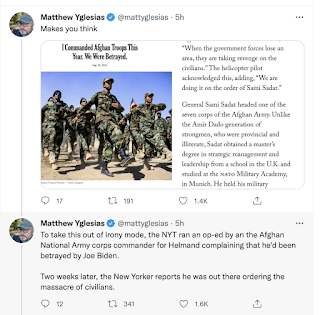 oh, lookie, hardcore propaganda from a war criminal on the Times.
oh, lookie, hardcore propaganda from a war criminal on the Times. I mean, the list of brutality is bad:
Then, take a look at the responses and how ham-fisted they were:
Muhammad Wali, an adult cousin: Villagers were instructed by coalition forces to stay indoors for three days as they conducted an operation, but after the second day drinking water had been depleted and Wali was forced to venture out. He was shot.
Khan Muhammad, a seven-year-old cousin: His family was fleeing a clash by car when it mistakenly neared a coalition position; the car was strafed, killing him.
Bor Agha, a twelve-year-old cousin: He was taking an evening walk when he was killed by fire from an Afghan National Police base. The next morning, his father visited the base, in shock and looking for answers, and was told that the boy had been warned before not to stray near the installation. “Their commander gave the order to target him,” his father recalled.
Amanullah, a sixteen-year-old cousin: He was working the land when he was targeted by an Afghan Army sniper. No one provided an explanation, and the family was too afraid to approach the Army base and ask.
Ahmed, an adult cousin: After a long day in the fields, he was headed home, carrying a hot plate, when he was struck down by coalition forces. The family believes that the foreigners mistook the hot plate for an I.E.D.
Niamatullah, Ahmed’s brother: He was harvesting opium when a firefight broke out nearby; as he tried to flee, he was gunned down by a buzzbuzzak.
Gul Ahmed, an uncle of Shakira’s husband: He wanted to get a head start on his day, so he asked his sons to bring his breakfast to the fields. When they arrived, they found his body. Witnesses said that he’d encountered a coalition patrol. The soldiers “left him here, like an animal,” Shakira said.
Entire branches of Shakira’s family tree, from the uncles who used to tell her stories to the cousins who played with her in the caves, vanished. In all, she lost sixteen family members. I wondered if it was the same for other families in Pan Killay. I sampled a dozen households at random in the village, and made similar inquiries in other villages, to insure that Pan Killay was no outlier. For each family, I documented the names of the dead, cross-checking cases with death certificates and eyewitness testimony. On average, I found, each family lost ten to twelve civilians in what locals call the American War.
Marzia, a woman from Pan Killay, recalled, “The Taliban would fire a few shots, but the Americans would respond with mortars.” One mortar slammed into her mother-in-law’s house. She survived, Marzia said, but had since “lost control of herself”—always “shouting at things we can’t see, at ghosts.”I do feel this one because I've heard several people say they did just that. But, they claim, "it worked". Sure, in the short term, but not long term.
And, again, we only heard a couple weddings here and there, but look at this evidence of following any funeral and hitting that too.
That night, an American bomb slammed into the room where the twin boys were sleeping, killing them. A second bomb hit an adjacent room, killing Mohammad’s father and many others, eight of them children.
The next day, at the funeral, another air strike killed six mourners. In a nearby village, a gunship struck down three children. The following day, four more children were shot dead. Elsewhere in Sangin, an air strike hit an Islamic school, killing a child. A week later, twelve guests at a wedding were killed in an air raid.
Oh, and what about the new warlords we left in charge? The kind trained in our hallowed elite institutions?
See the above pic. Sounds rough, huh?
In the hamlet of Yakh Chal, I came upon the ruins of an Afghan Army outpost that had recently been overrun by the Taliban. All that remained were mounds of scrap metal, cords, hot plates, gravel. The next morning, villagers descended on the outpost, scavenging for something to sell. Abdul Rahman, a farmer, was rooting through the refuse with his young son when an Afghan Army gunship appeared on the horizon. It was flying so low, he recalled, that “even Kalashnikovs could fire on it.” But there were no Taliban around, only civilians. The gunship fired, and villagers began falling right and left. It then looped back, continuing to attack. “There were many bodies on the ground, bleeding and moaning,” another witness said. “Many small children.” According to villagers, at least fifty civilians were killed.
Later, I spoke on the phone with an Afghan Army helicopter pilot who had just relieved the one who attacked the outpost. He told me, “I asked the crew why they did this, and they said, ‘We knew they were civilians, but Camp Bastion’ ”—a former British base that had been handed over to the Afghans—“ ‘gave orders to kill them all.’ ” As we spoke, Afghan Army helicopters were firing upon the crowded central market in Gereshk, killing scores of civilians. An official with an international organization based in Helmand said, “When the government forces lose an area, they are taking revenge on the civilians.” The helicopter pilot acknowledged this, adding, “We are doing it on the order of Sami Sadat.”
General Sami Sadat headed one of the seven corps of the Afghan Army. Unlike the Amir Dado generation of strongmen, who were provincial and illiterate, Sadat obtained a master’s degree in strategic management and leadership from a school in the U.K. and studied at the nato Military Academy, in Munich. He held his military position while also being the C.E.O. of Blue Sea Logistics, a Kabul-based corporation that supplied anti-Taliban forces with everything from helicopter parts to armored tactical vehicles. During my visit to Helmand, Blackhawks under his command were committing massacres almost daily: twelve Afghans were killed while scavenging scrap metal at a former base outside Sangin; forty were killed in an almost identical incident at the Army’s abandoned Camp Walid; twenty people, most of them women and children, were killed by air strikes on the Gereshk bazaar; Afghan soldiers who were being held prisoner by the Taliban at a power station were targeted and killed by their own comrades in an air strike. (Sadat declined repeated requests for comment.)
The day before the massacre at the Yakh Chal outpost, CNN aired an interview with General Sadat. “Helmand is beautiful—if it’s peaceful, tourism can come,” he said. His soldiers had high morale, he explained, and were confident of defeating the Taliban. The anchor appeared relieved. “You seem very optimistic,” she said. “That’s reassuring to hear.”Our elites are truly worthless beyond the pale. Again, a true scorch the earth policy, so how nice do you think the survivors will be? And, most who did the evil will get away scot free while the women of places like Kabul, innocent of all this, will bear the brunt of it. Don't get it twisted, staying was never an option. We just kept digging the grave for them.
So hopefully we use Afghanistan as a case for how to deal with drought and war conditions and help them turn it around. Lol, as if our elites cared for those people. But gotta fight for that.
ON to 🦠 News.
On the whole horse dewormer bit, here's some more on it. Kinda murkier than thought. Though it would still be wise to wait for more info on it.
"One of the authors of the meta-analysis, statistician Andrew Bryant at Newcastle University, UK, says that his team corresponded with Elgazzar before publishing the work to clarify some data. “We had no reason to doubt the integrity of [Professor] Elgazzar,” he said in an e-mail. He added that in a pandemic setting, no one can reanalyse all of the raw data from patient records when writing a review. Bryant went on to say that his group will revise the conclusion if investigations find the study to be unreliable. However, even if the study is removed, the meta-analysis would still show that ivermectin causes a major reduction in deaths from COVID-19, he says."
And there's some level of trying to head off the science before it's better studied, and that kinda thing really destroys trust. Because note the amount of people in those trials (30k) is dwarfed by the amount of people who have been vaccinated. So don't listen to grifters trying to sell you on something not yet proven (or less proven than sth like the vax... though this puts people's har har it's for horses stuff in the right context).
Carlos Chaccour, a global-health researcher at the Barcelona Institute for Global Health in Spain, says it has been difficult to conduct rigorous studies on ivermectin. That’s partly because funders and academics in wealthy countries haven’t supported them, and, he suspects, have often dismissed trials of ivermectin because most of them have been done in lower-income countries. Furthermore, says Rodrigo Zoni, a cardiologist at the Corrientes Cardiology Institute in Argentina, it is difficult to recruit participants because many people — particularly in Latin America — are already taking the widely available drug in an attempt to prevent COVID-19.
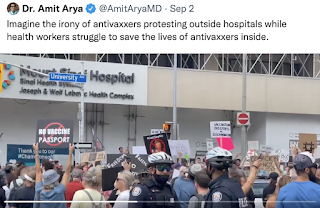
That's all good, but what about this argument?
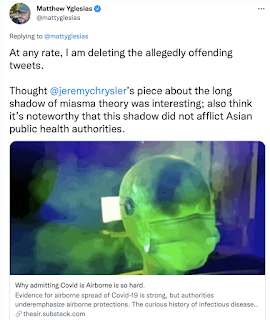


My only takeaway is why our health system/people were so behind the Asian ones? We need to learn something and fucking fast at that. We in the west did good vaccine style, but if we don't recover this last aspect we are losing in a big way (note, many of these places are run by people who previously learned from and looked up to the CDC). Again, how much of this is on Reagan's head? Him and his slash all gov idiocy and the derivatives that came after? Really need to look into it, people.
Trust is a huge issue, tbf:
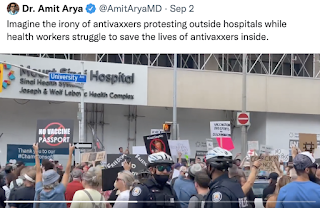
Again, our elites need more accountability. Speaking of which, it's not happening:

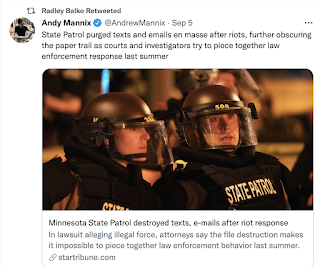 Any how, here's a fellow vet with some moment of truth for you:
Any how, here's a fellow vet with some moment of truth for you: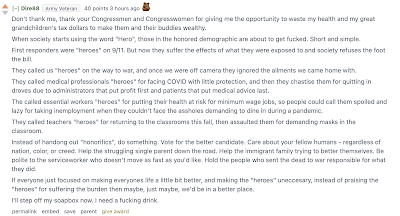
Anyways back to the title of the post: what about having been everywhere, man?
Well I have, but the thing is, claiming having been to a country or a place is more than just crossing a border, right? So I can list 40 countries that I've been to, or through, but that doesn't always mean much. The experiences in each and the people met make the difference, IMO. Of course, one would break it down in many ways, but here are the cities I've lived in, in terms of longest to shortest:
DodomaLansingNYC (though it could be broken down to Bronx/Manhattan, very different places)SeattleSpokaneDehliBaghdadAnn ArborFriedbergClarksvilleFayettevilleDenaliOn the Road/move. Jk, that's a little too much. Interesting for a man like me who's not really from anywhere (though I do love provincials, here or elsewhere, who have never left their fucking town telling me what's what about the world or life. And no, they haven't made up for their lack of world experience with a whole bunch of reading).
Enjoyed it? Share it via email, facebook, twitter, or one of the buttons below (or through some other method you prefer). Thank you! As always, here's the tip jar. paypal.me/nlowhim Throw some change in there & help cover the costs of running this thing. You can use paypal or a credit card.


Nelson Lowhim's Blog
- Nelson Lowhim's profile
- 14 followers



